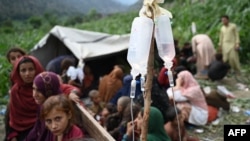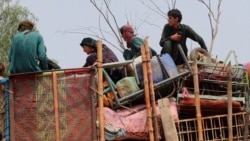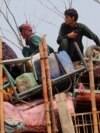ASADABAD, Afghanistan -- Sola woke up in a hospital teeming with survivors of a devastating earthquake that struck eastern Afghanistan.
After gaining consciousness, the young woman was informed that eight members of her family had been killed in the midnight tremor that killed over 2,200 people, mostly in the remote mountainous eastern province of Kunar, on August 31.
"I don't know who brought me here," Sola, who only gave her first name, told RFE/RL's Radio Azadi from her hospital bed in the provincial capital, Asadabad. "I have no one with me."
That includes her male relatives, who were all killed in the powerful 6.0-magnitude earthquake that flattened their family home, as well as many others in their village.
Under the Taliban, women cannot leave their houses or use public transport without a male guardian. Since seizing power in August 2021, the hard-line Islamist group has severely curtailed women and girls' freedom of movement, how they may appear in public, and their right to work and study.
Women also face major cultural and legislated obstacles to accessing medical care.
"There are no female doctors here," said Sola. "I have injuries on parts of my body that I can't show to male doctors."
Afghanistan has faced an acute shortage of doctors, medicine, and equipment. In some rural areas, there are no female medical professionals.
"I had a family, I had a home, but now I don't know where I will go or what I will do," Sola added.
Women 'Bear The Brunt Of This Disaster'
Experts warn that women and girls will be among those most affected by the disaster.
"Women and girls will again bear the brunt of this disaster, so we must ensure their needs are at the heart of the response and recovery," UN Women Afghanistan Special Representative Susan Ferguson said on September 2.
Fawzia Naseem, a female Afghan doctor who traveled to Kunar to treat survivors, said the situation for women and girls is extremely dire.
"Women and children are currently in urgent need of shelter and protection from further natural disasters as their [male] caregivers have died," she said.
"Their needs are many -- food, drinking water, and shelter. The greatest need is for tents and shelter, as many houses have been destroyed and the ones that remain are uninhabitable," Naseem added.















